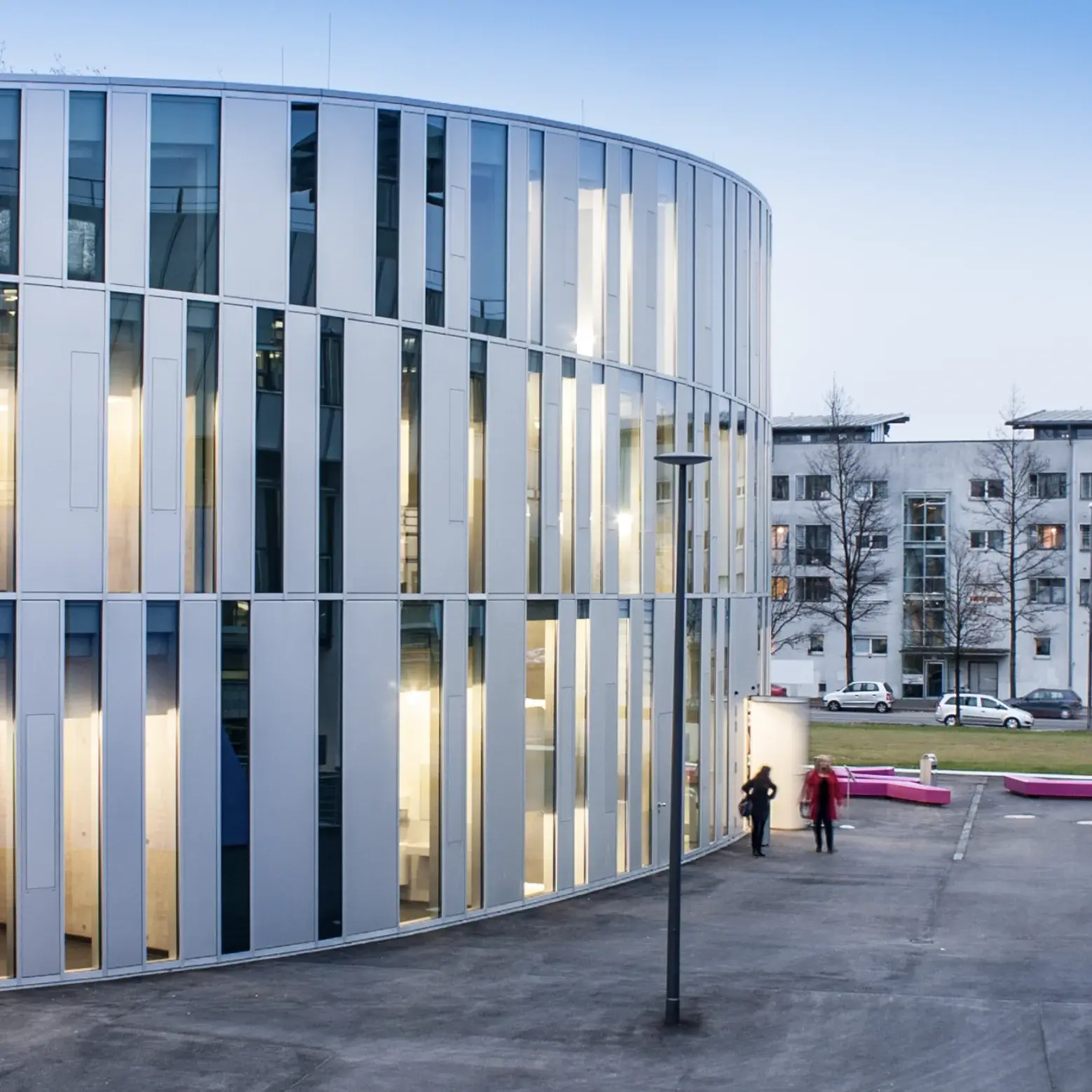


Discover our doctoral programme
In recent years, the Hochschule der Medien (HdM) has made significant progress in the area of research.
What was once a university of applied sciences with a clear focus on teaching has developed into a modern university of applied sciences that is actively involved in scientific discourse and is represented in many international scientific communities.
This is reflected not only in the growing volume of third-party funding, but also in the number and significance of recognised scientific publications. Doctoral programmes play a decisive role here. Our aim is to enable our Master's graduates and employees to gain access to further academic qualifications in the form of a doctorate.



Doctorate at a HAW?
Doctorates are not only possible at universities, but also at universities of applied sciences (HAW) - including the Hochschule der Medien (HdM).
As the HAWs in Baden-Württemberg do not have an independent right to award doctorates, the HdM cannot award doctorates on its own. Nevertheless, there are two ways to complete a doctorate at the HdM.
Paths to a doctorate at the HdM
1. doctorate via the Baden-Württemberg Doctoral Association
Since 29 June 2022, there has been a joint doctoral association of the UASs in Baden-Württemberg, which is authorised to award doctorates independently.
The HdM is also a member of this association and is currently represented by ten professors with a strong research background. The following members currently belong to the doctoral association: Prof Michael Burmester, Prof Arnd Engeln, Prof Ansgar Gerlicher, Prof Petra Grimm, Prof Gunter Hübner, Prof Nils Högsdal, Prof Yvonne Kammerer, Prof Johannes Maucher, Prof Richard Stang and Prof Gottfried Zimmermann. Prof Ansgar Gerlicher is also a member of the doctoral committee from Department III "Computer Science, Electrical Engineering".
Doctorates are possible in five research units - including social sciences, computer science and engineering.
The quality standards correspond to those of a doctorate at a university.
Further information can be found on the website of the doctoral association website.
2. cooperation with a university in Germany or abroad
For a long time, this traditional route was the only way for HAW graduates to obtain a doctorate.
The doctorate is formally awarded at a university that has the right to award doctorates.
Supervision is provided jointly by a professor from the HdM and the partner university.
The HdM co-operates with numerous national and international universities - for example with Swansea University.
The doctoral regulations of the respective university are decisive, which, among other things, define the requirements for acceptance as a doctoral candidate as well as the content and requirements of the doctoral programme.
Concrete steps towards a doctorate at the HdM
1. find a counsellor at the HdM
- Supervision is provided by a professor from the department in which the doctorate is based. They are often also referred to as the doctoral supervisor.
- Possible supervisors can be found on the HdM website. Particularly helpful here are the overviews of the degree programmes and the research lighthouses, which present the professors involved as well as the main subject areas.
- Ifyou have your own ideas and questions, it is advisable to contact suitable supervisors directly. It is advisable to develop a specific topic or an initial research question in advance that could arouse the interest of the potential supervisor.
- A look at thejob advertisementsof the HdM is also worthwhile: there are regular positions for research assistants that can be perfectly combined with a doctorate. One advantage of this is that funding is secured - at least in part - during the doctoral period. This should definitely be taken into consideration when planning.
2. clarify the promotion path
- Is there a university that offers to co-operate?
- What are their regulations?
- Is it better to do a doctorate via the doctoral centre if the supervisor is a member or has the prospect of membership?
3. conclusion of a supervision agreement
- The supervision agreement is concluded between the supervisor(s) and the doctoral candidate.
- Among other things, it regulates
- the general conditions of the dissertation project,
- initial agreements on a time and qualification plan to be updated and
- regular supervision meetings and progress reports.
- The specific structure depends on the doctoral regulations of the cooperating university or the doctoral association.
- An example of a supervision agreement can be found on the website of the Baden-Württemberg Doctoral Association.
4. start of the research work
- As soon as all formal requirements have been met, the actual academic work begins.
- The work on your own scientific research question is accompanied by a - partly compulsory - qualification programme. It teaches technical, methodological and organisational skills.
5. writing up the results in the dissertation
- The results of the research are recorded in the dissertation. There are two possible formats:
- Monographic dissertation: The entire thesis is presented in a continuous book.
- Cumulative dissertation: specialist articles are published during the research phase, which are later bundled together with an introduction and a summarising classification.
6. evaluation of the work
- The thesis is assessed by at least two reviewers. These are usually the supervisors.
- This is followed by an oral examination. The results of the research work are presented. The doctoral candidate answers questions from the examination committee and defends the thesis.
7. publication of the doctoral thesis
- The doctorate isnot considered complete until the doctoral thesis has beenpublished.
- Once the doctoral certificate has been awarded, the academic title "Doctor" may be officially used.



Contact and counselling
This information merely provides an initial insight into the various phases and steps of a doctorate - from the decision to publication. We would be happy to advise you in detail and individually on all your questions - also on further career planning after a doctorate (for example, a professorship at the HdM).
Please feel free to contact us!

Frequently asked questions and answers
The doctorate serves as proof of the ability to carry out in-depth academic work. It is based on an independent dissertation and an oral examination. Upon successful completion of the doctorate, the university awards a doctoral degree with a supplement indicating the subject area.
Developing your own research question, conducting the research and writing and defending the dissertation usually takes several years (approx. 3-5 years).
As a rule, admission to doctoral studies is granted to those who:
- has obtained a Master's degree (Master's degrees from HAWs also count) or
- has completed at least four years of study (or 300 ECTS) at a university, teacher training college or art college or
- has successfully completed a postgraduate degree programme at a university with the right to award doctorates.
- Foreign degrees must be checked in advance for formal equivalence.
- In addition to the general admission requirements, the doctoral regulations of the respective university or doctoral association may stipulate further requirements, e.g. the acceptance of doctoral candidates from other disciplines or a minimum grade for the Master's degree.
Glossary
Third-party funding
- Third-party funds are funds raised by universities.
- They are used to promote research, development, young academics and teaching.
- They supplement the regular university budget (basic funding).
- Funding comes from public or private sources, e.g. project funds from the federal government's research funding programme or funds from industry.
- Third-party funds can be made available to the university itself or one of its institutions.
- Full-time academics also have the opportunity to access this funding.
Further information on third-party funding:
Dissertation
- The dissertation is the doctoral thesis.
- It serves as an independent contribution to research in a specific subject area.
- The aim is to gain and document new scientific knowledge.
- These findings are recorded in the dissertation.
- The dissertation must be "defended" in an oral examination.
- "Defence" means that the doctoral candidate explains and justifies the results when asked by the examiner.
From doctoral candidate to doctorate
- Anyone who has successfully completed a doctorate may then use the academic title of "doctor".
- Depending on the subject area, the doctoral title is specified differently, e.g. Dr. -Ing. for engineers or Dr. rer. nat. for natural scientists.